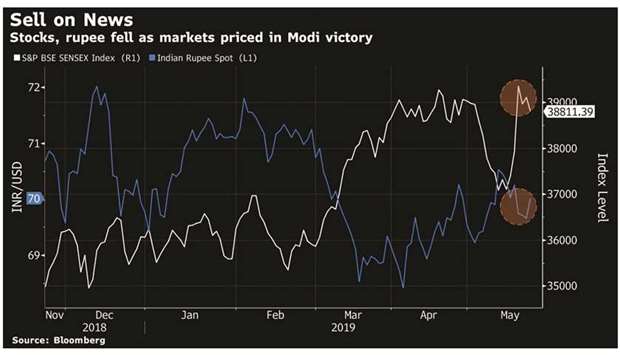The first reaction of investors to Indian Prime Minister Narendra Modi’s landslide election win was to bid up local assets. The euphoria didn’t last long.
Stocks fell after rallying to records and the rupee slid as investors refocused on domestic realities, and posted modest gains on Friday.
While Modi’s sweeping victory allayed fears of a group of diverse parties forming the government, his return coincides with a slowing economy, wider budget deficit, volatile oil prices and global trade tensions.
“Slowing growth, tricky inflation dynamics and the fact that the external environment has worsened with escalation in trade tensions are all potentially negative factors” affecting India, said Anders Faergemann, a fund manager in London at PineBridge Investments.
Markets had partially priced in the election outcome after exit polls this week pointed to Modi’s return to power, which explains Thursday’s buy-the-rumour, sell-the-fact reaction.
Also, last week’s rally has pushed up equity valuations to levels that are questionable in a country struggling to deal with a deteriorating macro environment.
“Forward multiples are demanding and when viewed against the backdrop of a slowing economy and earnings undershoot, they limit upside,” said Sriyan Pietersz, an investment strategist at Matthews Asia in Singapore. A strong mandate from the rural sector may prompt Modi to deliver on promises of cash income transfers to poor, which may widen the fiscal deficit, he said.
The government is already borrowing a record $100bn, a key reason behind why a big rally has eluded local bonds despite two rate cuts in 2019. The yield on benchmark 10-year debt declined two basis points to 7.22% on Friday in Mumbai. India’s rupee rallied 1.6% in the past three months, the most in Asia, amid wagers of Modi returning to power. Further appreciation may trigger purchases by the central bank, according to Amundi SA.
“The rupee has significantly outperformed its peers and further relative appreciation would act as a drag on India’s trade competitiveness,” said Abbas Ameli-Renani, a London-based portfolio manager at Amundi. “Whilst we have a positive bias on the rupee, we are not inclined to add to exposure at these levels.”
While Modi’s party in its second term is expected to wield more political strength, the stock market’s elevation will depend on the measures he takes to hasten growth, said Nilesh Shah, chief executive at Kotak Asset Management Co in Mumbai.
“Markets are pricing in double-digit earnings growth over next few years. From a risk reward point of view, it is delicately balanced,” Shah said.

Indian Market
